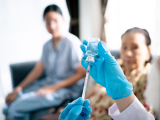Sep 21, 2004 (CIDRAP News) – In a bid to limit the threat of an influenza pandemic, the Department of Health and Human Services (HHS) is awarding a contract to Aventis Pasteur Inc. to make 2 million doses of a vaccine for humans to protect against H5N1 avian influenza.
"The vaccine that is being made is designed to match the H5N1 influenza virus that has killed 29 people in Thailand and Vietnam this year," HHS officials said in a news release. "If a pandemic of avian influenza virus H5N1 occurred in humans, the new vaccine would be used to protect laboratory workers, public health personnel, and, if needed, the general public."
The H5N1 virus caused widespread poultry outbreaks in East Asia this year. Disease experts fear that if the virus infected humans or pigs already carrying a human flu virus, the viruses might combine to form a new strain that could spread easily from person to person. All of the 40 human cases of H5N1 infection this year are believed to have resulted from exposure to birds, not from person-to-person transmission.
"This is an important step toward preparing our nation to respond to a pandemic influenza outbreak," HHS Secretary Tommy Thompson stated in the news release. "The reemergence of the avian flu in Asia this year is another sign that we have to develop and produce vaccines against the threat of a pandemic flu. The United States is the first nation to undertake this preventive measure on this scale."
HHS and Aventis listed the amount of the vaccine contract as "nearly $13 million."
The virus used to develop the vaccine was isolated from a human case-patient in Asia this year, according to Bruce Gellin, MD, MPH, director of the National Vaccine Program in Thompson's office. The vaccine involves a weakened form of the virus that triggers an immune response but does not cause disease, he told CIDRAP News.
Gellin said the contract is being awarded now so that Aventis Pasteur can make the vaccine during the lull between production periods for the regular annual flu vaccine. "We're taking advantage of the off-season of production of flu vaccine," he said. The season for preparing and producing regular flu vaccine, which has to be made each year to match circulating strains, runs from January to September, he noted.
"Basically they're making this the same way they would make any component of the annual vaccine," Gellin said.
Gellin said the dose size for the H5N1 vaccine has not yet been determined. The National Institutes of Health (NIH) is developing pilot lots of the vaccine for use in clinical trials that will start later this year or early next year, he explained. "The results [of the trials] will tell us how to formulate the bulk vaccine that's being manufactured now," he said.
Since the H5N1 virus might have to change before it could trigger a pandemic, Gellin acknowledged that there's no guarantee that the new vaccine would be effective against a pandemic strain. "There may be a need to have further refinement and have a different vaccine down the line," he said. But he added that because the vaccine is based on a virus isolated from a recent human case-patient, it should offer the best possible defense at this point.
Infectious disease expert Michael T. Osterholm, PhD, MPH, commented, "We don't know if this vaccine will offer any protection, should there be additional changes in the virus. But I think this is a very prudent and appropriate step to take at this time, and it reflects the importance we all place on the possibility of a pandemic strain." Osterholm, a longtime consultant to HHS, is director of the University of Minnesota Center for Infectious Disease Research and Policy, publisher of this Web site.
Aventis Pasteur will produce and store the new vaccine at its facility in Swiftwater, Pa., according to a company news release. "The H5N1 vaccine will be manufactured from a seed virus provided by the National Institute of Allergy and Infectious Diseases (NIAID)," part of the NIH, the statement said. "The seed virus is a weakened version of the wild type virus and was extensively tested prior to delivery to Aventis Pasteur."
The company said it signed an agreement with NIAID earlier this year to produce 8,000 doses of the H5N1 virus strain for use in the clinical trials.
The HHS announcement noted that a pandemic flu virus results from a major, sudden shift in the virus' structure that increases its ability to cause illness in a large share of the population. Most of the time, flu viruses evolve gradually, making it possible to keep up with them through minor modifications of vaccines.
Today's announcement comes less than a month after HHS released a draft plan for coping with a flu pandemic. The document, released Aug 26, warned that if a pandemic began today, the nation would not be ready with an effective vaccine or adequate supplies of antiviral drugs.
The HHS announcement also comes little more than a month after the NIH awarded Chiron Corp., Emeryville, Calif., a contract to make an investigational vaccine based on an H9N2 strain of avian flu. That virus infected three people in Hong Kong in 1999 and 2003 and also has the potential to evolve into a form that could spark a pandemic, according to the NIH.
Chiron will produce up to 40,000 doses of the H9N2 vaccine for clinical trials that the NIH plans to launch early in 2005.
See also:
Sep 21 HHS announcement
http://archive.hhs.gov/news/press/2004pres/20040921a.html
Aug 17 NIH news release on contract for H9N2 avian flu vaccine
http://www.niaid.nih.gov/news/newsreleases/2004/Pages/h9n2.aspx
HHS pandemic influenza response and preparedness plan (released Aug 26)
http://www.hhs.gov/pandemicflu/plan/



















